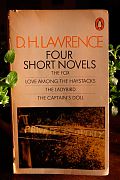
DH Lawrence
Four Short Novels
The Fox, Love Among the Haystacks, The Ladybird, The Captain's Doll
Like most of DH Lawrence’s fiction, these four novellas are careful examinations of The Relationship. It was Lawrence’s favorite subject and, to my mind, the subject with which he wrote the best, penetrating into the various meetings between man and woman. Also, three of the stories share the thread of war’s effects (World War I): an aimless, hopeless, lost feeling hovers misty in their air.
To compare Lawrence’s relationships with say, Tolstoy, it becomes readily apparent that Lawrence was working from some other direction; Lawrence did not idealize love, he rarely used the word and when he did it was to point out what the relationship was not. Who knows what love was to him but the least of what a couple shares in a physical relationship. It is the struggles to come together and the struggles once together which are more interesting.
In each of these novellas Lawrence begins with a relationship then adds a third person. The classic situation would be to begin with a husband and wife, but the love affair is hardly “normal” or predictable in The Ladybird. The Captain’s Doll starts with a man and his mistress, then comes the wife. It is in The Fox that this adding of a third rings the most perfect pitch, for it is the main line of the story.
March and Banford were two women who decided to live together, alone, in a small farmhouse. This was after the Great War and they raised some chickens for food and a bit of money. They lived quite happily and independently, especially from men. Then the fox came; the fox, the animal who wanted to eat the chickens, and the fox, the young man who intrudes into these two women’s harmonious lives. March and Banford’s contentment seemed to depend on there not being a man around, especially the type of man whose intentions were to marry. And it wasn’t that Henry was attracted to March in the usual way, it was her independence he wanted her to submit.
All our troubles, says somebody wise, come upon us because we cannot be alone. And that is all very well. We must all be able to be alone, otherwise we are just victims. But when we are able to be alone, then we realize that the only other thing to do is start a new relationship with another—or even the same—human being. — The Captain’s Doll
Love Among the Haystacks stands out the most of the four, for there’s no war and it’s a “love” story. It begins with two virgin brothers then adds a girl. It is a story of first love and welcome in this collection of stories that lacked, for the most part, “happy” endings.
But it is this lack which makes DH Lawrence so endearing to me, his ability to bore down into the truth of matters, our most human of traits and display them out for us, seemingly effortlessly. His characters are rarely beautiful, hardly charming, but because of that, they are so familiar.
· · · · · · · · · · · · · · · · · · · ·